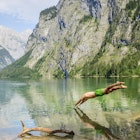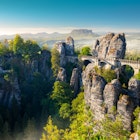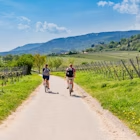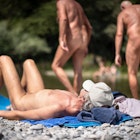
Aug 2, 2025 • 4 min read
Here are some local-approved destinations to spend your vacation in Germany.

Aug 2, 2025 • 4 min read
Here are some local-approved destinations to spend your vacation in Germany.

Jun 19, 2025 • 5 min read
With sparkling lakes, Alpine hikes, medieval cities and more, the German states of Bavaria and Baden-Württemberg have much to offer. Here are a few highlights.

Feb 27, 2025 • 11 min read
Saxony has the most distinctive identity of all of Germany's diverse regions. Here are the top things to do in this historic corner of eastern Germany.

Dec 17, 2024 • 15 min read
The German food scene has changed in recent years, with lighter dishes and more variety alongside Bavarian favorites. Here's what you should try.

Dec 4, 2024 • 4 min read
The origins of Krampus the Christmas demon dates back centuries and now, is a beloved and cherished tradition in many central European countries.

Jul 25, 2024 • 6 min read
Explore Germany by bike with these top cycling routes.

May 9, 2024 • 6 min read
From paying with cash to not crossing against a red light, here are the things you need to know before going to Germany.

May 8, 2024 • 3 min read
Find the perfect season for your visit to Germany with this guide to what's happening through the year.

May 8, 2024 • 5 min read
Germany has incredible hiking trails and they are meticulously maintained. Here are 6 of our favorites that cover the breadth of the nation.

May 4, 2024 • 5 min read
From Deutsche Bahn rail passes to camping in the summer months, there are plenty of ways to save money in Germany.

May 4, 2024 • 4 min read
Germany's public transportation network is one of the best in the world (and kids under 15 travel on trains for free). Read on for how to explore Germany.

May 2, 2024 • 5 min read
Visit historic towns, castles and palaces, plus epic mountains and remote beaches on these top touring routes through Germany.

Jul 23, 2023 • 4 min read
Do you know if you need a visa to visit Germany? We can help you work it out.

Jul 13, 2023 • 8 min read
With lots of family-friendly activities and a well-developed infrastructure, Germany is an ideal destination for families traveling with kids of all ages.

Sep 28, 2021 • 5 min read
From Bremen to Leipzig, move off the well-trodden paths to Germany’s wealth of smaller cities and you’ll be rewarded with surprisingly youthful energy

Jun 25, 2021 • 6 min read
For centuries the epic beauty of Germany’s landscapes has inspired artists, and its national parks highlight some of the country's best outdoor spaces.

Apr 7, 2021 • 5 min read
From the north coast seaside resorts to secluded lakeside sandy spots, here are Germany's best beaches.

Nov 23, 2020 • 6 min read
Enjoy black runs and rollicking après-ski alongside a culture-crammed winter break - the slopes aren't far from the cities in Austria and Germany.

Feb 3, 2020 • 6 min read
From tough Teutonic trails to silky ribbonesque rivers just asking to be run, Germany is an underrated adventure powerhouse.

Dec 11, 2019 • 6 min read
Writer John Garry explains how FKK (Free Body Culture) in Germany started and how following the rules led to his freedom.

Oct 31, 2019 • 5 min read
December in Germany means getting into the festive spirit with centuries-old traditions and a visit to a cosy Christmas market.

Oct 7, 2019 • 7 min read
Perched above a fairytale village where flowers bulge over every windowsill, hedges are neatly trimmed, and colorful shutters line the streets are vineyards…